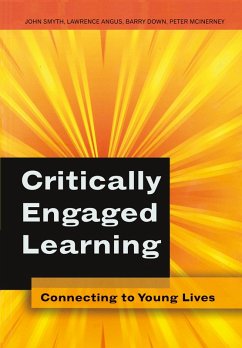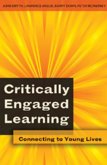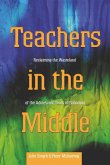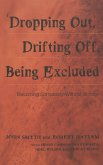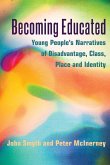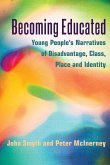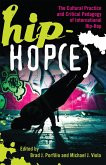This book - the finale in a trilogy by the authors - traces the way in which a number of disadvantaged schools and communities were able to move beyond deficit, victim-blaming and pathologizing approaches and access resources of trust, relationships, connectedness and hope. It describes how these Australian schools and communities were able to benefit from working with 'street-level' bureaucrats who had reinvented themselves around notions of socially just forms of capacity-building. The book provides a set of insights into what is possible from a critical engagement for school and community renewal perspective, by working with the resources that exist within disadvantaged contexts, even in damaging neoliberal policy times. Critically Engaged Learning breaks new and important ground across urgent and fractured boundaries.
Hinweis: Dieser Artikel kann nur an eine deutsche Lieferadresse ausgeliefert werden.
Hinweis: Dieser Artikel kann nur an eine deutsche Lieferadresse ausgeliefert werden.
"This book is an exciting completion of a trilogy addressing the educational needs of young people who are excluded and disengaged from school. It provides a sophisticated rebuttal to the view that marginalized youth need special programs. Instead, the book shows how critical engagement by educators, parents and young people creates educational spaces and places which all students can own and in which all thrive. Drawing on examples from a wide range of communities, the book shows not only how schools can make a difference, but how they do so - to enhance young people's learning and to build community capacity. The reader will be drawn into the communities and schools through the detailed and informative 'portraits' which illustrate the ways in which connections between young people, schools and communities are built, through familiarity with and critical engagement in local circumstances. Written with passion and with extraordinary depth of understanding, this book is a must forall educators." (Johanna Wyn, Professor in Education & Director, Australian Youth Research Centre, The University of Melbourne)
"This book is an antidote to the litany of studies marred by neoliberal beliefs and deficit thinking - a refreshing and substantive book that challenges mainstream work on engagement. Finally, a work that seriously utilizes critical democracy and the robust notions of equity and social justice to student engagement and learning that involve life to its fullest. The book's approach of creating narrative portraits is impressive." (John Portelli, Professor & Associate Chair, Co-director, Centre for Leadership & Diversity, Department of Theory and Policy Studies, OISE/University of Toronto)
"In an era obsessed with school reform, it is refreshing to read a book that brings community activism and renewal to center stage." (Gary Anderson, Professor, Steinhardt School of Culture, Education and Human Development, New York University)
"An analysis of change and educational disadvantage that begins with respect for people has been long awaited. For too long education has been dominated by the emptiness of leadership and the damaging fiasco produced by neoliberal improvement and effectiveness policies. Smyth, Angus, Down and McInerney have used portraits to show how labels such as disadvantage are offensive, and how re-enchantment with learning is not only possible but vital if young people are to be made, in their words, 'powerful people'. I cannot think of another team who can pull off the interplay between scholarship and strategy in ways that demonstrate that education needs research, theory and most important of all, the energy to produce reality within the narratives of the recommended approaches for change." (Helen Gunter, Professor, School of Education, The University of Manchester)
"The authors show genuine respect for youth and the multiple spheres in which their education occurs. While documenting the local, the authors take us beyond that and connect to the global. This book points us in hopeful directions that envision cultivating youthful critically engaged citizens." (Kathryn Herr, Professor, Montclair State University; Editor, 'Youth and Society')
"This book is an antidote to the litany of studies marred by neoliberal beliefs and deficit thinking - a refreshing and substantive book that challenges mainstream work on engagement. Finally, a work that seriously utilizes critical democracy and the robust notions of equity and social justice to student engagement and learning that involve life to its fullest. The book's approach of creating narrative portraits is impressive." (John Portelli, Professor & Associate Chair, Co-director, Centre for Leadership & Diversity, Department of Theory and Policy Studies, OISE/University of Toronto)
"In an era obsessed with school reform, it is refreshing to read a book that brings community activism and renewal to center stage." (Gary Anderson, Professor, Steinhardt School of Culture, Education and Human Development, New York University)
"An analysis of change and educational disadvantage that begins with respect for people has been long awaited. For too long education has been dominated by the emptiness of leadership and the damaging fiasco produced by neoliberal improvement and effectiveness policies. Smyth, Angus, Down and McInerney have used portraits to show how labels such as disadvantage are offensive, and how re-enchantment with learning is not only possible but vital if young people are to be made, in their words, 'powerful people'. I cannot think of another team who can pull off the interplay between scholarship and strategy in ways that demonstrate that education needs research, theory and most important of all, the energy to produce reality within the narratives of the recommended approaches for change." (Helen Gunter, Professor, School of Education, The University of Manchester)
"The authors show genuine respect for youth and the multiple spheres in which their education occurs. While documenting the local, the authors take us beyond that and connect to the global. This book points us in hopeful directions that envision cultivating youthful critically engaged citizens." (Kathryn Herr, Professor, Montclair State University; Editor, 'Youth and Society')

